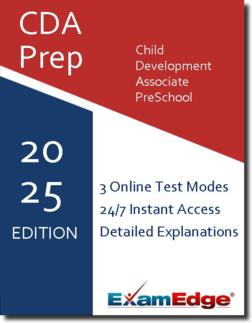Child Development Associate - PreSchool (CDA) Practice Tests & Test Prep by Exam Edge - Topics
Based on 29 Reviews
- Real Exam Simulation: Timed questions and matching content build comfort for your Child Development Associate PreSchool test day.
- Instant, 24/7 Access: Web-based Child Development Associate PreSchool practice exams with no software needed.
- Clear Explanations: Step-by-step answers and explanations for your CDA exam to strengthen understanding.
- Boosted Confidence: Reduces anxiety and improves test-taking skills to ace your Child Development Associate PreSchool (CDA).

Understanding the exact breakdown of the Child Development Associate PreSchool test will help you know what to expect and how to most effectively prepare. The Child Development Associate PreSchool has multiple-choice questions The exam will be broken down into the sections below:
| Child Development Associate PreSchool Exam Blueprint | ||
|---|---|---|
| Domain Name | ||
| Planning a safe and healthy learning environment | ||
| Advancing children’s physical and intellectual development | ||
| Supporting children’s social and emotional development | ||
| Building productive relationships with families | ||
| Managing an effective program operation | ||
| Maintaining a commitment to professionalism | ||
| Observing and recording children’s behavior | ||
| Understanding the principles of child development and learning |
CDA Preschool Exam Format
The CDA Preschool Exam consists of 65 questions on a variety of subjects covering the growth and development of children ages 3 to 5 years. Test-takers are given 1 hour and 45 minutes to complete the exam.
- Health
- Learning Environment
- Safety
Establishment and maintenance of a safe, healthy learning environment
- Provide children with surroundings that prevent injury
- Promote food and habits that prevent illness
- Create Preschool surroundings that encourage trust and learning
- Cognitive
- Communication
- Creative
- Physical
Advancement of physical and intellectual competence
- Provide activities that encourage mental growth
- Actively promote the development of children’s communication skills
- Encourage children’s creative play and expression
- Implement practices, activities, and equipment that encourage motor skills
- Guidance
- Self
- Social
Support social and emotional development and to provide positive guidance
- Support children inappropriate behaviors
- Help children develop social skills
- Develop relationships that teach children pride in their identity
- Families
Establishment of productive relationships with families
- Create positive encounters and support connections with families
- Program Management
Ensuring a well-run, purposeful program that is responsive to participant needs
- Support effective operation and administration
- Professionalism
Commitment to professionalism
- Engage in appropriate actions, aligned with professional ideals


